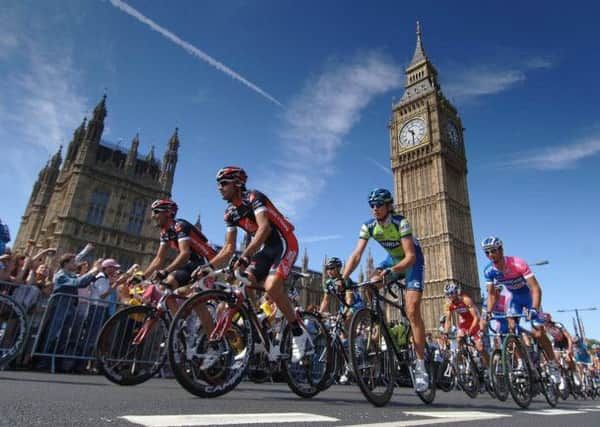County seeks to replicate capital gains from Tour


The City of York Council-led Cycle Yorkshire initiative has the backing of all 21 local authorities in the county, tourism agency Welcome to Yorkshire and British Cycling, among other organisations.
The mission statement is that everyone in the White Rose county will have access to a bicycle by 2023.
Advertisement
Hide AdAdvertisement
Hide AdIt is a bold aspiration, but there is no harm in shooting for the stars over the next decade.
A good gauge of whether it is possible, might be to look to the city that Yorkshire hands the Tour de France over to on Monday, July 6 – London.
What represents a ground-breaking event for sport in Yorkshire actually marks the third time the capital has hosted a stage of the Tour de France.
In 1994, Dover, Brighton and Portsmouth hosted two stages during the first week at a huge cost to those regions, and at a time when British cycling was in a moribund state.
Advertisement
Hide AdAdvertisement
Hide AdThen in 2007, London made such a success of staging the Grand Départ that it left Tour organisers the Amaury Sports Organisation yearning to come back.
Seven years later and the race returns, with the lasting legacy left in London no doubt having played a significant role in the decision to cross the Channel once more.
That legacy is a 10 per cent increase in the amount of people using bikes in London since the Tour’s visit in 2007.
Ten per cent is not a massive number and would not equate to the same figure being targeted by Cycle Yorkshire, but as a tangible amount it is highly creditable.
Advertisement
Hide AdAdvertisement
Hide AdOne man who worked on the 2007 Tour de France for Transport for London is now that company’s head of cycling, and the man responsible for a smooth, safe and memorable stage three as it enters the capital.
“When people saw the Tour in 2007 it inspired them to get their bike out and cycle a few miles,” says Chris Mather.
“I was one of the people who saw the Tour de France and thought ‘right, I’m going to cycle to work every day’ and there’s no faster way to get around London than on a bike.
“The Mayor of London (Boris Johnson) last year invested £930m into the cycling infrastructure in London, making it easier for people to get involved and ultimately to create a cycle-ised city.
Advertisement
Hide AdAdvertisement
Hide Ad“That’s all from the tremendous legacy of 2007 when we staged the Grand Départ.”
London has hosted major bike races every year since 2007, including the inaugural Prudential RideLondon festival last year and the Olympic road races in 2012.
“We are getting well-versed in delivering this kind of event now,” adds Mather, “so we’re comfortable with what we’re doing, but in no way under-estimating the amount of work.”
A lot of what was put in place in 2007 in terms of road closures and crowd management are blueprints still in operation today.
Advertisement
Hide AdAdvertisement
Hide AdThe tricky part for the London organisers this year is that the 159km stage that starts in Cambridgeshire and weaves through Essex, is on a Monday.
“The big issue we have found this time is that it’s on a weekday, and it comes right into the thick of London.
“We’ve seen it as an opportunity to attract people who wouldn’t usually spectate to get them out and watch the race pass them by, whether that’s out of the office window or out of their school.
“So we hope to have a good mix of fans, with not just cycling aficionados but people who wouldn’t usually show an interest.
“The Tour in 2007 was very successful, so there was no need to change that much.”